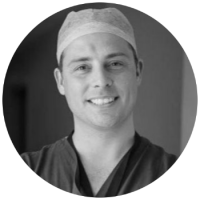How does lens replacement treatment work?
Lens replacement surgery is effectively the same operation as cataract surgery, only we choose to bring it forward in time and perform the procedure before the development of cataracts.
Importance of choosing the correct lens.
The procedure itself involves a keyhole surgery approach during which we remove the natural lens of the eye. We then replace it with a lens implant made out of a high-grade biomedical plastic. The choice of lens implant is absolutely critical in lens replacement because what we’re trying to do is, with lens replacement surgery, we’re trying to remove the need for patients to wear glasses and that includes the need to correct the distance vision, intermediate vision, such as television range vision, but also fine close-up reading vision.
And in order to achieve all three of those so that we have to see all three of distances without glasses, we need to choose our lens implant very, very carefully to correct any imperfections in the patient’s vision. So how does the actual treatment itself work, so it’s a day case procedure which takes somewhere between 10 to 20 minutes to perform, for each eye? It’s possible to either do both eyes on the same day, one after the other, or one eye at a time on separate days.
Lens replacement procedure.
During the procedure itself, it’s a local anesthetic procedure performed with the patient lying on their back looking into a bright light. We use a keyhole surgery approach during which we remove the natural lens of the eye, we then leave behind the ligament which holds the natural lens in place and into that ligament we place the lens implant itself. All of it is done through a keyhole surgery approach and takes, as I say between 10 to 20 minutes.
About the Author

Mr Alex J Shortt
MB BCh MSc PhD FRCOphth PGDipCatRef
Consultant Ophthalmic Surgeon
Alex J Shortt is a Consultant Ophthalmic Surgeon at Grange Eye Consultants. With many years of experience and expertise in Corneal surgery, Cataract surgery, and Refractive surgery, he is providing his patients with a wide range of treatment options. As he has worked as a consultant and trainer in advanced technologies for correcting vision for over 14 years, he has a broad knowledge of various eye conditions and can, therefore, find the best suitable solution for every individual client. Apart from working as an Ophthalmic Surgeon, Dr. Shortt is also involved as an editorial board member of the Cochrane Collaboration’s Eyes and Vision Group and expert advisor to the European Medicines Agency.
